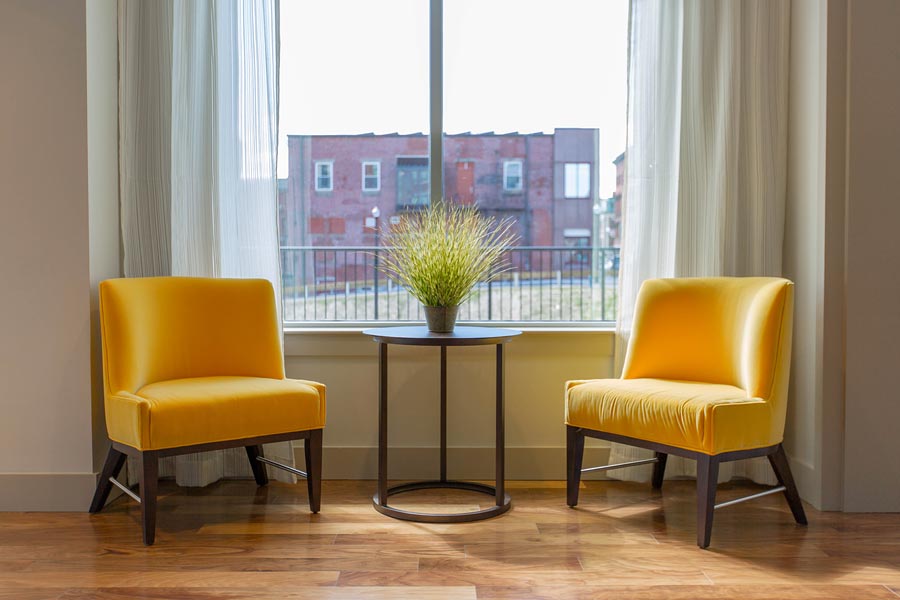
How to support a loved one with anxiety
Published by Mandi Simons on 7 December 2022
When you are struggling with anxiety, you may find it difficult to make sense of your emotions, and so you might find it hard to communicate your feelings to the people around you. Consequently, many people may not know how best to support someone who is suffering with anxiety. This can be compounded by the fact that there are no visible symptoms of anxiety, so you may be struggling, but your loved ones might not be aware of the difficulties that you are facing. Seeing someone close to you struggling with anxiety and panic attacks can be distressing. But there are many things that you can do to support them.
Look for the signs
The first thing that you can do is look out for the signs. You know your loved one well, so you probably know when they are struggling. But there are a range of symptoms you can look out for.
They may be showing some physical signs that they are feeling the effects of anxiety, such as sweating, nausea, shortness of breath or light-headedness. They may share the anxious thoughts they are having, such as persistent worrying, believing the worst will happen or making assumptions or over generalisations. Or, you may see signs of anxiety through their behaviours, such as avoiding situations, irritability or frustration or seeking reassurance.
Spotting the signs early and recognising when your loved one is struggling will give you the opportunity to support them more quickly and effectively.
Calm Concern
When a loved one is struggling, it is important that you stay calm. Anxiety is driven by fear, so staying calm will help keep them calm and prevent the anxiety from escalating. Offer them calm reassurances that it will pass, that they are ok, and you are there to support them.
Ask them about their feelings, get them to talk about what they are feeling and respond without judgement. It is important that you show your concern, that you understand and accept how they are feeling. Don’t be dismissive. Offer them sensitive and compassionate acceptance so their feelings are validated, and they don’t feel belittled.
Ask them what they need
Don’t try to take control of the situation and tell your loved one what they need to do. Ask them how they want you to support them. This could be doing some breathing exercises with them, they might just want your calm reassurances, they might just want to be distracted from their thoughts, or they might want to discuss their fears and how they are feeling.
By asking them how they want to be supported, you are putting your loved one in control, and making them feel valued and supported.
Over time, you will learn how to support your loved one with their anxiety. What support they need from you, and what techniques help in their time of crisis, so you can offer timely and effective support whenever they are struggling. You support will go a long way to helping them manage their anxiety better.
If your loved one’s anxiety is more frequent, or it is having a huge impact on their day-to-day life, talking to a professional can really help. While your support when they are struggling will help, the long-term goal for them should be to understand their anxiety better, and to find ways to manage it so they can live the life on their terms.
If you or a loved one are struggling with anxiety or panic attacks, please get in touch to see how counselling and psychotherapy in Hampstead or online can help.

What is Social Anxiety?
Published by Mandi Simons on 24 November 2022
Social Anxiety has become a term that people use more freely to describe anyone that feels withdrawn and self-conscious. However, Social Anxiety Disorder is far more than shyness and it can have a profound impact on the lives of people who struggle with it.
For many of us, feeling a little nervous in new social situations, speaking to an audience or going on a date is perfectly normal. But with social anxiety, also called social phobia, everyday situations and interactions can lead to feelings of significant anxiety, self-consciousness and embarrassment. These feelings can often interfere with relationships, daily routines, work, school or social gatherings.
What are the symptoms of Social Anxiety?
The important thing to note about Social Anxiety Disorder is the physical symptoms that you feel when your anxiety flares up. Unlike normal feelings of nervousness like a dry mouth, butterflies or shaky hands, the symptoms of Social Anxiety can be far more pronounced and may have a dramatic impact on your everyday life.
If you are experiencing social anxiety, you may feel one or more of the following: blushing, fast heartbeat, excessive trembling, sweating, upset stomach or nausea, trouble catching your breath, dizziness or light-headedness, muscle tension and the feeling that your mind has gone blank.
What causes Social Anxiety?
Social anxiety may develop during late childhood and can present as extreme shyness or just avoiding social interactions. It can be the result of bullying, teasing or abuse; it can also come from a variety of family dynamics. It is more prevalent in females than in males and the gender difference is more extreme in adolescents and young adults. As the person gets older and if their anxiety is left untreated, it can be a burden for the rest of their life, preventing them from living their life to the fullest and achieving their full potential.
Social anxiety maybe fear driven. It could be the fear of being judged, the fear of feeling embarrassed, humiliated or accidentally offending someone. It can also stem from the fear of feeling awkward or uncomfortable when meeting new people or the perceived risk involved in trying out new experiences.
Living with social anxiety?
Many people who suffer from social anxiety disorder don’t seek help and prefer to avoid situations that make them anxious. They avoid going out, they shy away from speaking in front of an audience or they avoid eye contact when speaking, which can affect their quality of life.
There is a lot of support out there if you are struggling with social anxiety. One of the best ways to take control of your social anxiety and explore ways to help you cope when it flares up is talking to a counsellor.
To learn more about how we provide counselling and psychotherapy for people living with social anxiety in Hampstead or online, don’t hesitate to call at any time at any time.
-fw.jpg/$file/blog-card-2022-social-media($1$)-fw.jpg)
The Damaging Effect of Social Media on Teenage Mental Health
Published by Mandi Simons on 16 September 2022
Almost all of us would admit that we spend too much time on our phones. Even before the pandemic, which dramatically increased our online presence, we lived in a world that was dominated by smartphones, apps, and in particular different forms of social media, such as Instagram, Twitter, and Facebook.
As counsellors and psychotherapists in Hampstead and online who work with young people as well as adults, we have noticed how social media and technology has an especially damaging impact on teenagers. It is now the norm for young people to spend a major portion of their day in front of some kind of screen, whether it’s their phone, a TV, tablet, or laptop. Some teenagers record nearly eight hours of screen time a day.
Of course, this level of dependence can have a corrosive impact on a young person’s mental health. They are trapped in a cycle whereby they feel bored, look at their phone, receive a dopamine hit from doing so, put their phone down, get bored again, and go back onto the same apps they were looking at five minutes ago. They end up craving their phone, and it becomes an automatic pattern.
The automatic nature of teenagers using social media is an especially harmful trait. Our work as counsellors and psychotherapists often involves using mindfulness, working with people to bring themselves more into the present moment and make them more mindful of what they are doing, thinking, and feeling in each moment. Social media, it goes without saying, severely inhibits a teenager’s ability to be mindful. They are on autopilot, scrolling through apps in a mindless way, which takes them out of their body and more into their own head, thereby accentuating problems like anxiety and depression.
There are many ways in which social media negatively influences a teenager’s self-esteem. Platforms like Instagram, for example, cause young people, particularly teenage girls to always compare themselves to others, which in turn makes them feel inadequate in some way. While this is a problem for anyone, it becomes notably problematic for young girls. Every day, they are met with unrealistic expectations and beauty standards through the many ‘perfect’ profiles on social media, from high-profile influencers to their own friends, along with the continued presence of popular culture, with the Kardashians being a famous example.
Spending so much time in this bubble inevitably leads to a sense of isolation, inadequacy, and reinforces problems like anxiety and depression. Social media is an endless loop that prevents teenagers from being mindful and truly connecting with themselves, as well as other people in the real world. It can be used in a mindful, considered way, but most of the time it isn’t, and we have to be aware of the problems this can cause.
If you or someone you know struggles with this pattern of behaviour, as so many people do, we are here to offer confidential, personalised counselling and psychotherapy in Hampstead and online, where we can use mindfulness and other modalities as a way of bringing you closer to the present moment. Please get in touch to arrange your initial consultation.
-fw.jpg/$file/blog-card-2022-menopause($2$)-fw.jpg)
The Importance of Opening Up About Menopause
Published by Mandi Simons on 3 September 2022
Our counsellors and psychotherapists in Hampstead and online work with people of all ages to overcome a range of different problems, such as depression, anxiety, low self-esteem, addiction, bereavement, relationship issues, life transitions, and so on. One area that doesn’t receive the attention it deserves, however, is menopause and perimenopause.
This is a phase of life that all women go through, leading to a series of potential physical issues, such as hot flushes, disturbed sleeping patterns, or feelings of fogginess, among other symptoms. These problems are well known, but often the emotional impact that stem from menopause and perimenopause is overlooked.
Although progress has been made recently, there still remains a considerable stigma around discussing women’s health - in particular fertility and ovulation. Women generally don’t feel comfortable speaking about these issues, even to close family members or friends. And when it comes to menopause, it can feel like more sensitive. If you are experiencing menopause your mood can change, you may feel more vulnerable, more emotional, and perhaps behave in a different way. Women going through menopause often have less patience with others, which can cause friction in social circles.
Everyone experiences menopause differently, but one thing that extends across all women is that it is an important and significant life transition. It is only in the past few years that there is a greater awareness and openness to talk about the menopause. Many people who experience perimenopause feel anxiety about what is to come, while those going through menopause will often speak about it as if it were a bereavement, due to the way that it is a life event that involves something coming to an end.
Being alone with these feelings only makes the process harder. Women going through this life transition need to feel supported, not alone, and have someone who understands their difficulties and emotions as they embark on this journey. Menopause is a challenging time, but it is also a process of letting go, of coming to terms with and ultimately embracing a new stage of your life. While it is the case that some women do grieve during menopause, they can also feel freer, and more like themselves.
If you are someone who is going through perimenopause or menopause and want to talk through your feelings as you explore this chapter of your life, we are here to offer confidential, personalised menopause counselling in Hampstead or online. Please get in touch to arrange an initial consultation.

Why Loneliness Is Such a Problem for Young People in 2022
Published by Mandi Simons on 24 May 2022
This month, Mental Health Awareness Week in the UK focuses on the problem of loneliness. More or less everyone has struggled with isolation to a certain degree since March 2022, but this issue has been particularly damaging for teenagers. Even before the pandemic, research has shown that a high proportion of teenagers often feel lonely.
Adolescence is a time for making friends and having new experiences, but for many reasons, teenagers often find themselves alone in their room, on their phone, and cut off from the world. The sheer dominance of social media, combined with enforced ‘remote work’ and ‘virtual meetings’, has led to young people spending a considerable portion of their day in front of a screen of some kind – their phone, TV, iPad, or laptop. Some young people spend eight hours a day on their phones.
There are, of course, some advantages to connecting with others online, but a more notable impact of social media on young people is the extent to which it induces anxiety, low self-esteem, and a feeling of envy. Platforms like Instagram cause children to constantly compare themselves to others. The pressure to present one’s ‘best self’ online makes others feel inadequate and jealous of their own friends, or even strangers, and causes them to withdraw into themselves.
Often there is talk about how social media helps us ‘connect’, but for teenagers, daily usage of major apps like Facebook, Twitter, and Instagram causes them to feel more estranged from other people. This is especially the case with teenage girls, who are relentlessly subjected to unrealistic beauty standards through seeing a stream of seemingly ‘perfect’ profiles on social media.
The pandemic accelerated the potentially damaging effects of social media. We can see, based on this experience, that it needs to be managed – otherwise young people will continue to feel more isolated and inadequate, laying the template for potential mental health issues like anxiety or depression.
Along with social media, exam stress became another teenager-specific issue that was exacerbated by the pandemic. A whole age bracket – those who were 16 in 2020 – did not get to sit GCSEs during the pandemic, but now have to face the stress of sitting A-Levels. Many students understandably feel anxious about not being equipped to handle the stress of an exam environment. The lack of preparation has created additional pressure, which becomes worse when you’re isolated from others and always on your phone.
After two years of considerable instability and enforced isolation, many teenagers have withdrawn inside themselves. And with society now ‘opening up’ again ahead of summer, there will be a measure of anxiety. As parents, it is important to listen closely to our teenage children and encourage them to go easy on themselves, rather than place additional pressure on them. It may be that seeing a confidential professional would give your teenager the space they need to express themselves and feel connected to others.
To learn more about how we provide counselling and psychotherapy for young people in Hampstead or online, don’t hesitate to get in touch with us at any time.

Mental Health Awareness Week 2022: The Impact of Loneliness
Published by Mandi Simons on 4 May 2022
The impact of loneliness is the theme for this year’s Mental Health Awareness Week in the UK. It is a very pertinent theme, as many clients seeking counselling and psychotherapy in Hampstead or online with one of our therapists have come to us with struggles around loneliness, or issues that have been exacerbated by extended periods of time alone.
Following such a prolonged period of enforced isolation brought about by COVID-19, people of all ages, from teenagers to the elderly, have come through the pandemic feeling more withdrawn. Being away from friends and family for long periods of time will possibly lead to a person retreating, which can ultimately cause issues like anxiety, depression, addiction, or low self-esteem to develop.
Being alone can often make a problem feel worse. If you struggled with anxiety or depression before the pandemic, it is likely that these issues proliferated during lockdown. As we now approach the first ‘normal’ summer since 2019, one of the main priorities of this year’s Mental Health Awareness Week should be the question of how to build more meaningful, substantial connections with friends, family, colleagues, and the wider community in general.
However, as our team of counsellors and psychotherapists have seen first-hand, this is not always so simple. Social media sites such as Instagram, Twitter, and Facebook have generated a feeling of isolation, of being estranged from people who are seemingly having more fun and leading more interesting lives than you. Whilst social media obviously has its benefits, envy and loneliness are two major issues that are important to learn to acknowledge and manage.
Along with issues arising from social media, our work life has also contributed to problems around loneliness. Many people have had no choice but to work from home for over two years now. And whilst a good number are slowly returning to the office, either full-time or as a hybrid approach, others are faced with the prospect of working from home indefinitely – often from their bedroom, thereby consigning someone to work and rest in the exact same space. This is an extremely isolating phenomenon and something that can, over time, cause a number of issues.
Mental Health Awareness Week is a good time to take a moment to reflect on this issue reach out to others. Simply checking in on someone via text could have an extremely powerful impact on them. And while 2022 may be a time when technology, culture, and work conditions all foster a heightened sense of loneliness, we also live in an era of openly talking about one’s mental health problems and actively seeking professional help – which wasn’t always the case. There is much less of a stigma around speaking to a counsellor or psychotherapist. It is no longer a taboo subject; mental health is spoken about everywhere, in a serious manner. We now live in a world where seeking a therapist is actively encouraged.
If you are feeling lonely, isolated, and struggle with problems like depression or anxiety, my practice offers personalised, strictly confidential counselling and psychotherapy in Hampstead and online. Feel free to get in touch with me at any time and I will make sure you are assigned to a therapist who suits your particular needs.

How Do I Choose the Right Therapist for Me?
Published by Mandi Simons on 3 April 2022
If you are experiencing anxiety, depression, or any mental health issue, you might be thinking about seeking counselling or psychotherapy in Hampstead or online. I know that this process can be a little bit intimidating; reaching out for help is incredibly difficult, especially if you are doing it for the first time. We have a team of practitioners who specialise a range of different issues and therapeutic techniques, such as CBT (Cognitive Behavioural Therapy) and Mindfulness.
You may be wondering, then, about how to make sure you work with a therapist who suits you. Feeling comfortable with your practitioner is very important, which is why I take care to make sure you are matched with the right professional. Here’s how it works:
Initial Consultation
To start with, you will always come to me first for an initial consultation. During this time, I will ask some questions about what brought you to therapy, the emotions and thoughts you are currently experiencing, and get an overall picture of the kind of person you are. All of this information allows me to understand the specific form of support you might need.
Referral
Having gained a picture of your current issues and the kind of person you are, I will select from our wide range of friendly professionals a therapist who would be best suited to you. Not only will I match your particular problem with a certain specialist (an addiction specialist for someone going through addiction, for example), but also someone whose personality is compatible with yours and helps you to feel at ease.
Your First Session & Ongoing Support
You will begin sessions with the therapist matched with you, either at their Hampstead practice or online. They work autonomously with you and take care to build a strong therapeutic relationship based on trust and open communication, creating a friendly, strictly confidential space for you to explore your emotions in your own way. I currently don’t take on clients myself, so you may not work with me, but I act as the bridge between you and the therapist best equipped to help with your particular needs.
To arrange your first session of counselling or psychotherapy in Hampstead or online, please get in touch and we will pencil in a time for an initial consultation.


-fw.jpg/$file/blog-card-2020-exercise($1$)-fw.jpg)